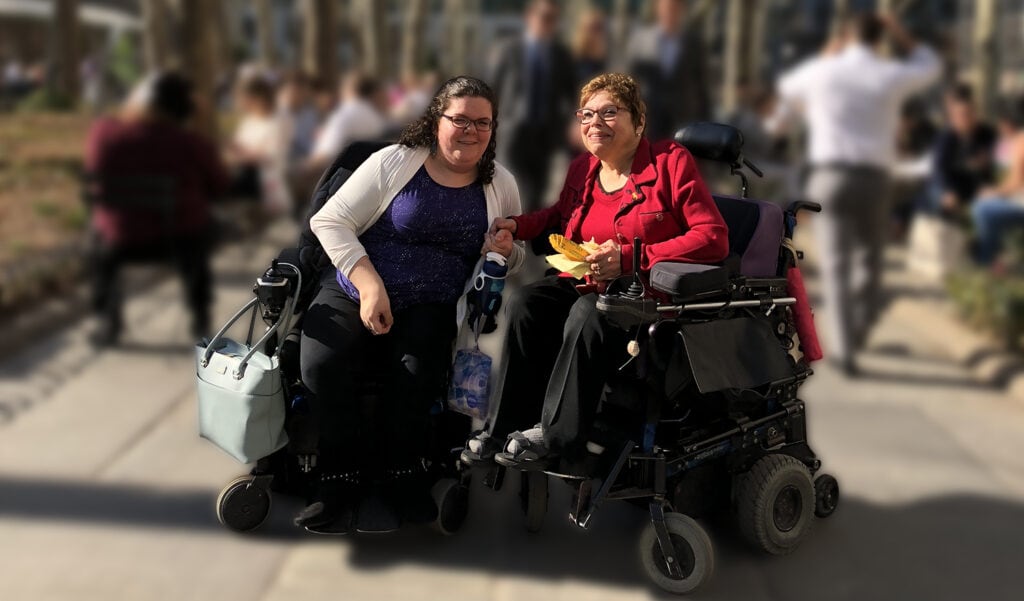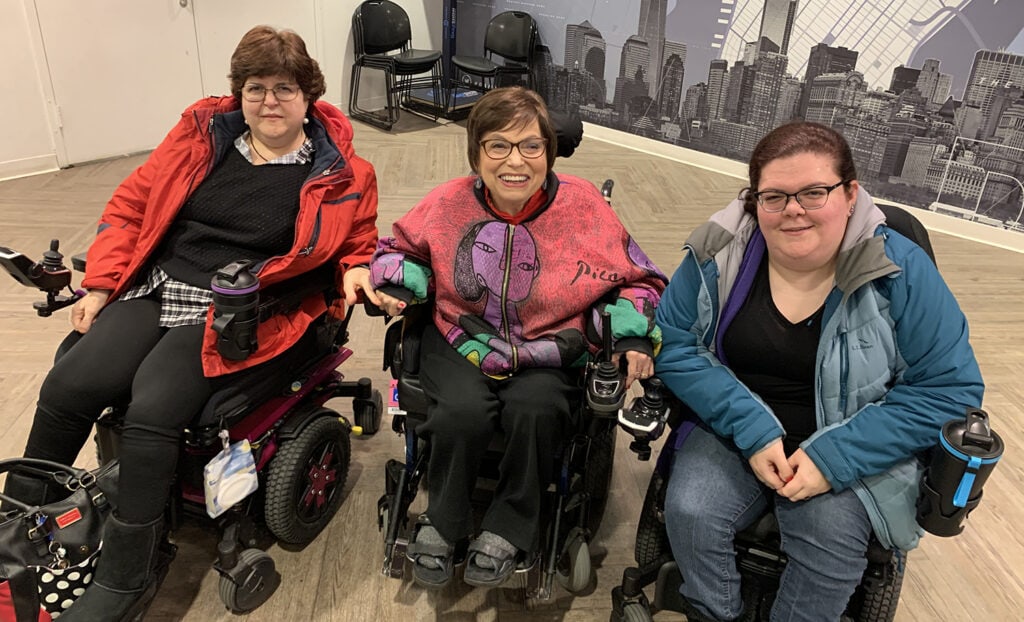
On an unseasonably warm day in February 2018, Judy Heumann and I met for lunch in Manhattan. Or, more accurately, I wasn’t particularly hungry but got to enjoy Judy’s company as she made a beeline for the nearest street food cart. She had her heart set on a “New York frankfurter,” which she loved. To be quite honest, I hate hot dogs, but her enthusiasm almost made me want to eat one. This was my first one-on-one time with Judy, known as the “Mother of the Disability Rights Movement.”
As we rolled around Bryant Park, talking and getting to know each other, I was overcome by the realization that we were in the very same city where Judy had grown up, and where she had fought (and won) so many battles against ableism and inaccessibility. I imagine that for Judy, our time together was just another Wednesday doing one of the things she did best: mentoring and sharing advice with younger generations. For me, it was the pages of history coming to life.
“Reading stories of activists like Judy was a revelation. It was a key to accepting ourselves as we are.”
I didn’t grow up knowing who Judy was, though her legacy had already long since been established. I was born just one year and three days after the 1990 passage of the Americans with Disabilities Act — a law that Judy’s activism helped lay the foundation for. But my mainstream public school education never afforded me the opportunity to learn about her alongside other civil rights heroes. It wasn’t until midway through college, after encountering some disability-related challenges in my pursuit of a teaching career, that I decided to pivot my career aspirations to focus on disability rights issues. This trajectory somewhat aligned with Judy’s, who had filed a successful landmark civil rights lawsuit in 1970 when the New York City Board of Education denied her a teaching license on the basis of her disability.
Only after this shift in my goals did I begin to dive into learning about disability. I did a summer internship at my local center for independent living, where I started to immerse myself more fully into the work of the disability rights movement. (Notably, Judy was deputy director of the Berkeley CIL in California, the first CIL in the world.) And as I started to come to an understanding of the history behind me, I finally found myself on the journey to developing a sense of disability pride.
People are often surprised to learn that disability pride was not a part of my upbringing, because my mom, Ellen, has the same disability as I do. She grew up fairly isolated in a suburban town. The only other disabled person she encountered with any regularity was her younger brother, Jonathan, who also shares our diagnosis. Although Judy, 14 years my mom’s senior, was already out there making a “fuss” (as she says in her book) about disability rights from coast to coast and embracing her disability identity, my mom struggled to perceive her own disability as anything but a curse.
This deeply negative perception of disability stayed with my mom through much of her life. When she learned while pregnant that she had passed on her disability to me, my mom began to grapple with immense guilt and fear that I would resent her. No one in her life had ever taught her to feel otherwise, so she wasn’t equipped with the emotional tools to teach me a sense of identity and pride.
Though I didn’t grow up thinking of my disability as a curse like my mom did, and never once felt an ounce of resentment toward her, I often wanted to disassociate from my disability entirely. In fact, the biggest compliments you could pay me were “I don’t think of you as disabled,” or “I forgot you use a wheelchair.” This all started to change as I uncovered the beautiful culture of disability pride that Judy helped normalize and introduced my mom to as well. For so much of our lives, neither my mom nor I saw ourselves reflected back at us, so reading stories of activists like Judy was a revelation. It was a key to accepting ourselves as we are.
I came to realize that without the tireless activism of Judy and her contemporaries, my life could have been entirely different. While attending mainstream public school, I had a 504 plan, so named because Section 504 of the Rehabilitation Act of 1973 requires public schools to offer accommodations for eligible students with disabilities. Judy’s tenacity was integral to ensuring these regulations were enacted. In 1977, alongside a multitude of collaborators committed to disability rights and social justice, Judy led what’s known as the “504 Sit-In.”
While activists occupied U.S. Department of Health, Education and Welfare offices around the country, Judy and over 100 others occupied the San Francisco office for 26 days, pushing for the signing of Section 504 regulations to prohibit any employers or organizations receiving federal funds from discriminating against disabled people. It was this powerful protest that laid the groundwork for the ADA, which Judy’s fierce advocacy and strong testimony would later help to pass.
To say that Judy paved the way for disabled people is an understatement. But if you were to ask Judy about her groundbreaking activism, she’d be quick to tell you that everything she took part in was so much bigger than just her.
One of the most beautiful examples of this ethos could be seen in Judy’s appearance on The Daily Show with Trevor Noah, taped on March 4, 2020 — three years to the day before she passed away. During her interview, Judy talked about both her memoir and Crip Camp, the documentary that features her story, saying, “What I think is really important about my story is that my story isn’t my story. So, my story is really the story of many other people … Friends of mine with disabilities living in different parts of the world, they’re also talking about how this is their story.”
In that particular moment, Judy’s story really did feel like my story too, because I had the immense privilege of being there in the audience. By that point, Judy’s presence in my life had grown, from someone I admired from afar to a true role model and friend. She had reached out before the show to offer two of her guest tickets to my mom and me, so we had front row seats to support Judy and cheer her on. I distinctly recall tearing up as I watched the show unfold, overwhelmed by the disability representation happening in front of me.

It was a pivotal moment not just for me, but also for my mom. There we were, two wheelchair-using Jewish New Yorkers, getting to witness Judy, another wheelchair-using Jewish New Yorker, sharing her truth. While both of us were navigating our respective journeys toward feeling a sense of disability pride, my mom started out reluctant to join the ride. On that day, however, it was clear that my mom was proud of who she is, proud of us, proud to be part of the disability community. And that was thanks in no small part to being in Judy’s orbit.
But as Judy would have said, this story is about so much more than my mom and me. Judy was a part of so many people’s stories. After her passing, my social media feeds were flooded for days with remembrances and pictures, each one shining a spotlight on Judy’s impact. She was truly a trailblazing legend, and yet she was never self-important. She was much more interested in unearthing your life story, finding people to connect with you and figuring out how she could support you.
And to so many who were part of her life, she radiated the “bubbe” energy of a Jewish grandma. I regularly experienced this in the form of Judy’s numerous inquiries into my relationship status. Knowing I was in a long-term relationship, she would check in to see how things were going. In February 2022, Judy texted me, “OK none of my business well maybe a little bit of my business when are you getting engaged?” That relationship ended a few months later, but I wish I could talk to her just one more time to tell her I’ve since found a guy I know she’d happily approve of.
Though my mom and I are very much still mourning her loss, we’re also celebrating Judy’s life, as are countless others around the globe. Not only were we surrounded by a full house plus two extra rooms of people when we paid our respects at Judy’s funeral, but also by thousands upon thousands more who joined virtually.
One of Judy’s greatest strengths was creating connections and bringing people together, and the scores of attendees who gathered at her memorial were proof that she continues doing so even after her passing. As Judy’s dear friend Colleen Starkloff remarked when she spoke at the funeral, “Every woman in this room is Judy’s sister; every man in this room is Judy’s brother. Family is what Judy was about, and she created it everywhere she went.” The disability community was Judy’s family. We are all Judy’s family.
How lucky the world is to have had Judy in it. But the fight for disability rights does not simply start and end with her. Because Judaism was such a central part of her identity, it feels apt to reflect on how we can continue carrying her work forward with this quote from the Talmud, a collection of ancient Jewish teachings: “You are not obligated to complete the work, but neither are you free to abandon it.”
Whether you identify with any religion or none, I hope this resonates. It’s a reminder that while none of us bears the full weight of working toward social change, we also must not give up the good fight. Following in the well-worn tracks of Judy’s wheels, we can all find within ourselves the power to create a more accessible, equitable world.
Support New MobilityWait! Before you wander off to other parts of the internet, please consider supporting New Mobility. For more than three decades, New Mobility has published groundbreaking content for active wheelchair users. We share practical advice from wheelchair users across the country, review life-changing technology and demand equity in healthcare, travel and all facets of life. But none of this is cheap, easy or profitable. Your support helps us give wheelchair users the resources to build a fulfilling life. |


This is just a wonderful and uplifting reflection. May Judy rest in love and power. What a legacy of strong women!!!!